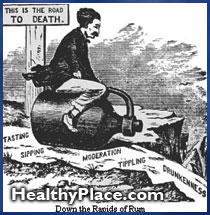Stanton Peele's Approach
Stanton Peele has been investigating, thinking, and writing about addiction since 1969. His first bombshell book, Love and Addiction, appeared in 1975. Its experiential and environmental approach to addiction revolutionized thinking on the subject by indicating that addiction is not limited to narcotics, or to drugs at all and that addiction is a pattern of behavior and experience which is best understood by examining an individual's relationship with his/her world. This is a distinctly nonmedical approach. It views addiction as a general pattern of behavior that nearly everyone experiences in varying degrees at one time or another.
Viewed in this context, addiction is not unusual, although it can grow to overwhelming and life-defeating dimensions. It is not essentially a medical problem, but a problem of life. It is frequently encountered and very often overcome in people's lives - the failure to overcome addictions is the exception. It occurs for people who learn drug use or other destructive patterns as a way of gaining satisfaction in the absence of more functional ways of dealing with the world. Therefore, maturity, improved coping skills, and better self-management and self-regard all contribute to overcoming and preventing addiction.
"Addiction is a way of coping with life, of artificially attaining feelings and rewards people feel they cannot achieve in any other way. As such, it is no more a treatable medical problem than is unemployment, lack of coping skills, or degraded communities and despairing lives. The only remedy for addiction is for more people to have the resources, values and environments necessary for living productive lives. More treatment will not win our badly misguided war on drugs. It will only distract our attention from the real issues in addiction."
Stanton Peele, "Cures depend on attitude, not programs," Los Angeles Times, March 14, 1990.

Stanton's approach puts him at odds with the American medical model of alcohol/drug abuse as a disease - one which is gaining acceptance worldwide. Everything about the disease approach - separating people and their substance use from their ongoing lives, not recognizing that addiction fades in and out with life conditions, viewing it as biogenetic in origin - is wrong, which Stanton strives to show throughout this website. The notion that drug and alcohol abuse are inevitably progressive, a holdover from the Temperance view, is one example of how modern addictionology is really moralistic and theological rather than scientific and pragmatic. The Stanton Peele Addiction Web Site (SPAWS) presents a range of novel and constructive solutions to policy, scientific, treatment, and personal problems that befuddle current approaches.
Stanton has managed to maintain his cutting-edge approaches and attitudes for more than a quarter century, involving himself in central issues of policy, treatment, education, theory, and research on addiction, drugs, and alcohol. SPAWS is replete with articles, debates, conflicts, and advice on problems that cover the gamut of drug, alcohol, and addiction policy. If you are concerned about behaviors that trouble you in yourself or loved ones, about policies towards drugs, about how people are treated for alcoholism, about whether substance abuse is genetic, about cultural variations in substance use and a thousand other current controversies, then Stanton's work is critical.
Stanton Peele's Ideas
The experiential, environmental approach leads to a range of radical ideas for approaching seemingly insoluble social problems concerning drugs, alcohol, and behavior. For example:
- a science of addiction geared towards brain mechanisms, irrespective of life problems and experiences, is barking up the wrong tree and is doomed to fail;
- self-cure is standard and occurs as people come to grips with the problems, people, and patterns in their lives;
- as they do so, formerly problem users frequently learn to use the substance moderately, or at least with fewer problems;
- treatment succeeds by helping people navigate their existence rather than by teaching them that they have an inbred, life-long malady;
- most drinking and other substance use are not pathological;
- how children learn to view substances largely determines whether they get stuck in drinking/drug use as a life-long destructive habit;
- a completely negative educational approach to alcohol, as well as drugs, increases the likelihood children will encounter substance use problems;
- the notion that substance use is a disease is simply the wrong way to prevent problems and to treat problems when these appear;
- many activities which are correctly viewed as addictions - like compulsive shopping, gambling, sex - have incorrectly come to be treated as diseases;
- one wrongheaded result of the whole disease conception of addiction is that society now often excuses people for criminal behaviors that are labelled as addictions or diseases (e.g., PMS, post-traumatic shock, post-partum depression in addition to alcoholism);
- while it is correct instead to firmly punish drug- and alcohol-related misbehavior, the punishment of simple drug use - so-called "zero-tolerance" - is irrational and has been proven to be an expensive failure;
- non-moralistic policies, education, and treatment that recognize that people may sometimes use drugs or alcohol, but that engage people in productive activity and assist people to overcome difficulties in their lives, will succeed better - and certainly disrupt society and the lives of users less - than our current policies and treatments.
The Addiction Experience
In Stanton's approach, addiction can be understood only in experiential terms. No biological mechanisms create addiction; no biological indicators detect addiction. People are addicted when they pursue a sensation or activity relentlessly and sacrifice other life alternatives to this pursuit, and when they cannot face existence without this one involvement. We know people are addicted by their behavior and experience: nothing else defines addiction.
Addiction must be understood in relation to an experience. This experience is defined, in part, by the nature of the substance or the involvement. For example, heroin produces an analgesic, depressant, and soporific experience; cocaine and cigarettes create a different variety of drug experience. Gambling produces an experience similar to the stimulant drugs, as does sexual excitement. An insecure love relationship can have elements of both depressant and stimulant experiences - hence its remarkable virulence.
The other elements that determine the addictive potential of an experience are the setting or environment in which it is undertaken, and the characteristics of the individual who undertakes it. This was driven home by the Vietnam experience, in which young men addicted to the pain-relieving experience of heroin in the Vietnam environment rejected the same experience stateside. Only some of these men - those more likely to have had a negative sense of their environment before going to Vietnam - continued to be susceptible to heroin addiction in the States.
The characteristics of an addictive experience (as perceived by a given individual in a specific environment) are as follows:
The experience
- is powerful and all-encompassing,
- inspires a sense of well-being by conveying an artificial sense of power and control, peace and insulation,
- is valued for of its predictability, which makes it reassuring and thus "experientally safe,"
- creates negative consequences that diminish the addict's awareness of and ability to relate to the rest of life.
When people - either in their lives generally of in particular life situations - cannot gain a necessary sense of power, control, safety, assurance, and predictability, they turn to and rely on addictive experiences.
next: Denial of Reality and of Freedom in Addiction Research and Treatment
~ all Stanton Peele articles
~ addictions library articles
~ all addictions articles
APA Reference
Staff, H.
(2009, January 5). Stanton Peele's Approach, HealthyPlace. Retrieved
on 2026, February 27 from https://www.healthyplace.com/addictions/articles/stanton-peeles-approach



